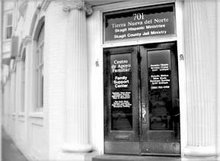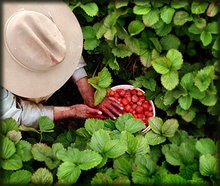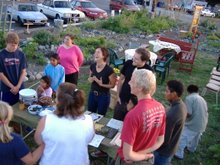 Spring 2006
Spring 2006Bob Ekblad, Executive Director
At Tierra Nueva, we’re hearing with increased clarity and urgency the need to embrace the excluded, tainted ones. Whether labeled and discarded by insiders as “illegal aliens,” “felons,” “homeless,” “drug addicts” “habitual offenders,” or “mentally ill,” Jesus calls his body to bear his shame and announce victory to all who find themselves “outside the camp.” This is in fact what we found ourselves doing during four back-to-back Bible studies on Hebrews 13:11-14 last Thursday night in Skagit County Jail.
For the bodies of those animals whose blood is brought into the holy place by the high priest as an offering for sin, are burned outside the camp.
“Unclean things were cast outside the Israelite camp, outside the city of Jerusalem to protect the rest from danger and contamination,” I explain to the first group of 20 red-uniformed inmates who sit in a circle. Outside the camp, animal carcasses were destroyed (Lev 16:27), lepers resided (Lev 13:46), menstruating women were sent (Num 5:2-3), and criminals were executed (Lev 24:14, 23; Num 15:35-36; Deut 22:24).
“Who are the people considered unclean and excludable by those who see themselves as ‘inside the camp’ today?” I ask.
“We are,” a number of them say immediately. “The homeless,” says someone else. Others mention undocumented workers, people living with AIDS, sex-offenders.
“So let’s see where God is located according to this Scripture,” I suggest, inviting a volunteer to read the next verse.
Therefore Jesus also, that he might sanctify the people through his own blood, suffered outside the gate.
The men are moved to see that Jesus identifies himself with the ones outside the camp. We read Luke 15:1-2, which states that “all the tax-collectors and sinners were coming to listen to him,” provoking the insiders to grumble.
“So Jesus is someone who suffers with the outsiders. What else does he do according to this verse?” I ask.
We discuss how Jesus sanctified them by his blood, which means that he made unholy, rejected ones holy, righteous or set apart—even special. I ask if any of them have tried and failed to make themselves holy or righteous. Everyone responds that they have tried and failed repeatedly.
The inmates are moved to discover that Jesus himself makes the unclean, excluded ones righteous through his blood, shed for them. On the cross, outside the camp (John 19:20; Mk 15:20; Matt 27:32), Jesus does what no human can do on their own. He makes us holy, righteous, and special through bloodshed, suffering among the damned. When I ask each group whether they want to receive the gift of holiness offered to them by Jesus, people in each of the four groups unanimously and enthusiastically say “yes.”
“Well, you don’t have to go very far to get Jesus’ help, because if you’re already outside the camp, Jesus is here with you,” I say, asking someone to read the next few verses: Hence, let us go out to him outside the camp, bearing his shame. For here we do not have a lasting city, but we are seeking the city which is to come (Heb 13:11-14).
“I’m the one who has to go father than any of you, as I’m inside the camp,” I say, realizing I’m the only one not dressed in a red jail uniform.
“No you don’t, because you’re here with us,” someone immediately responds, making me feel warmly included—strangely free of shame.
At the beginning of the fourth Bible study, I mention an impression I had received of someone with a painful knee. Everyone around the circle of eight begins to detail other pains in their bodies, ending with a man who has a painful left knee. I invite everyone to lay hands on themselves and pray that the healing power of the Spirit would flow through their hands into their bodies. Everyone has their hands on at least two places.
When I ask them to check their bodies after the prayer, I’m shocked to find that everyone—all eight—have been healed of all their pain. They respond to my repeated invitations to continue praying by insisting that all their pain is really gone. It is easy for this group to believe the good news of Jesus’ presence with them.
Jesus welcomes us to join him outside, where we find relief from striving for righteousness, and from our pain. Jesus has already done for us what we desperately desire and need, but can’t do for ourselves. He has done away with all “us-them” distinctions in a subversive act of removing all borders. This is the good news of the Kingdom of God that we enthusiastically welcome and boldly announce.





